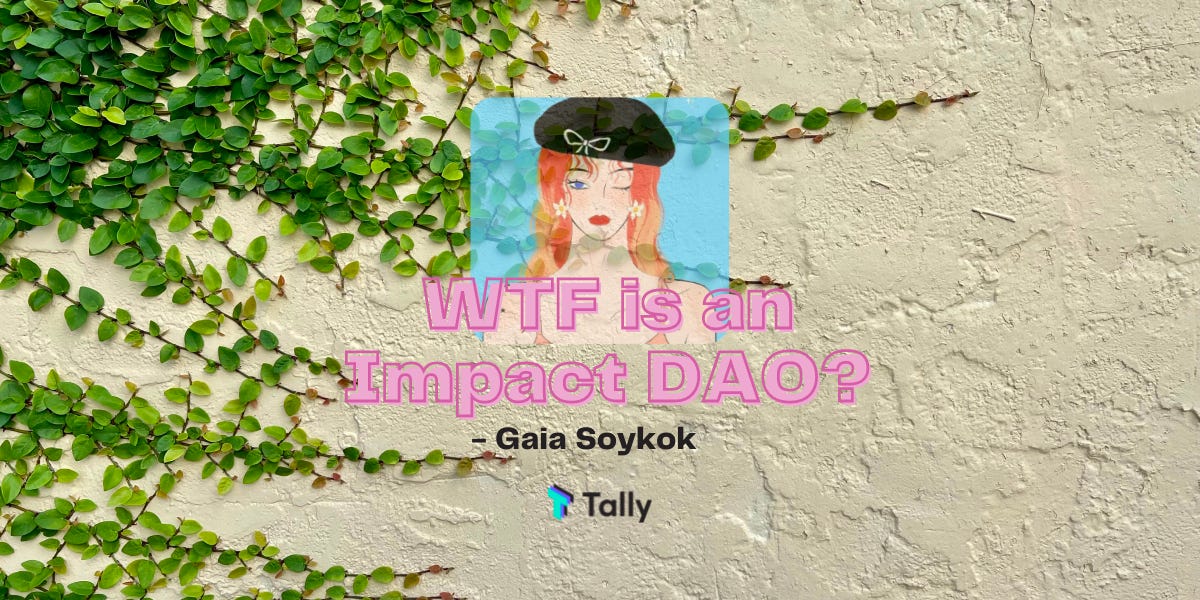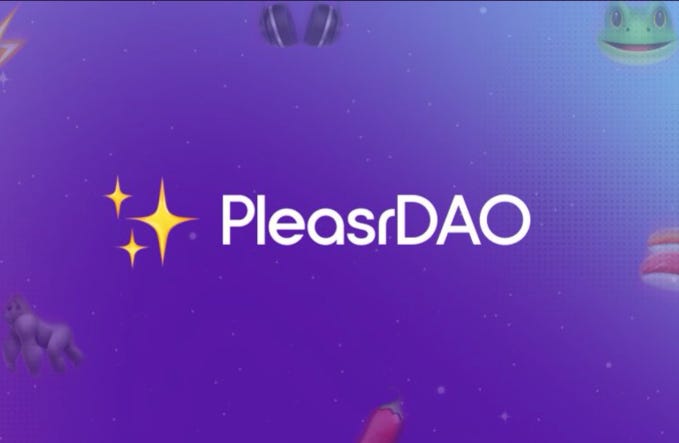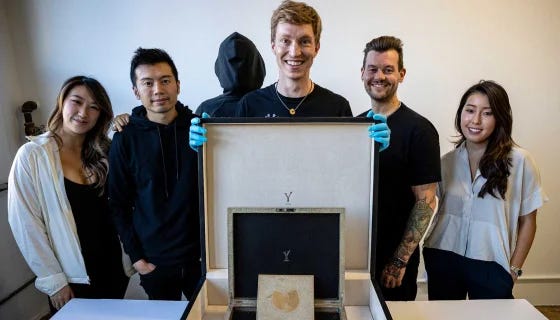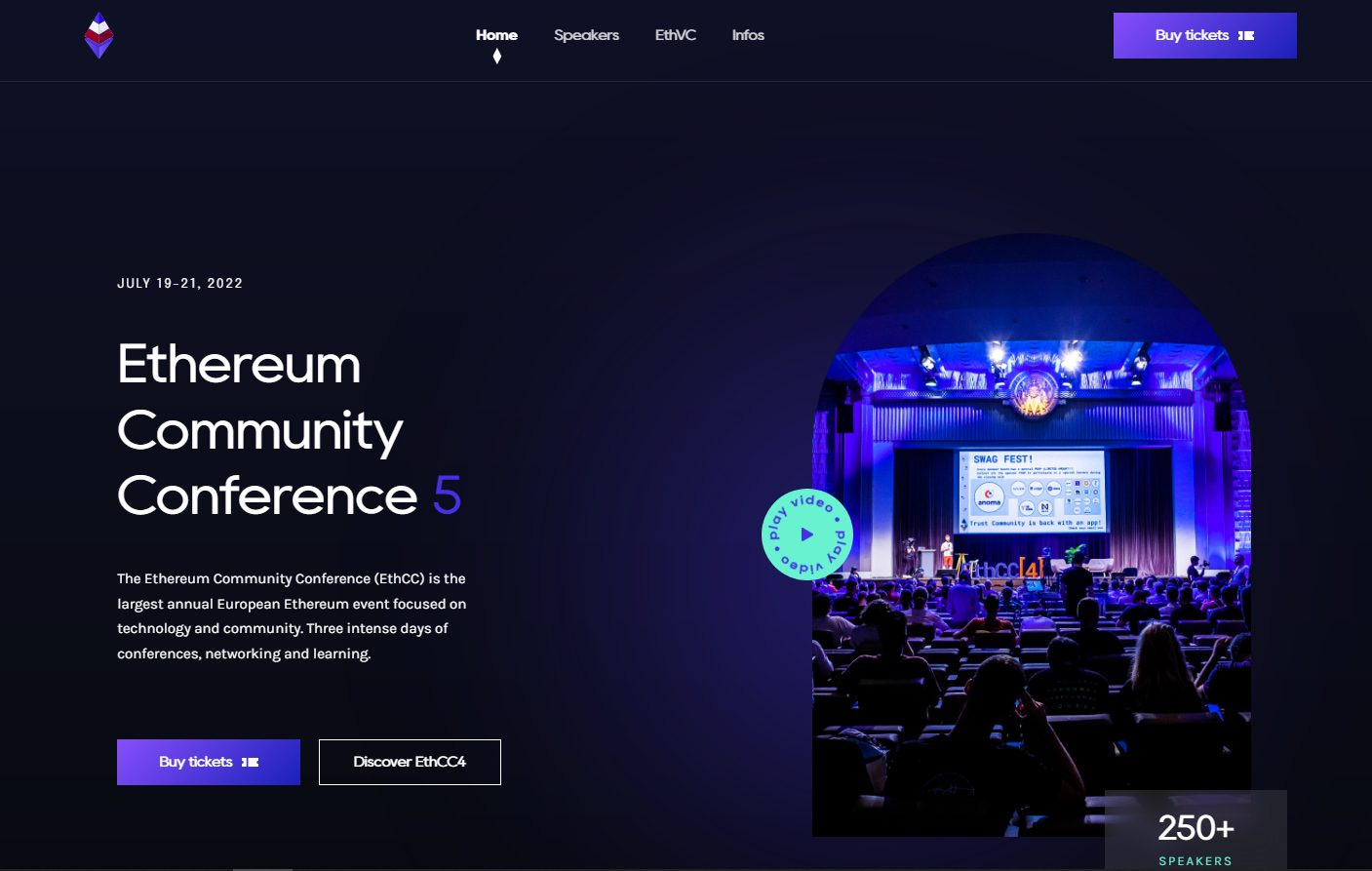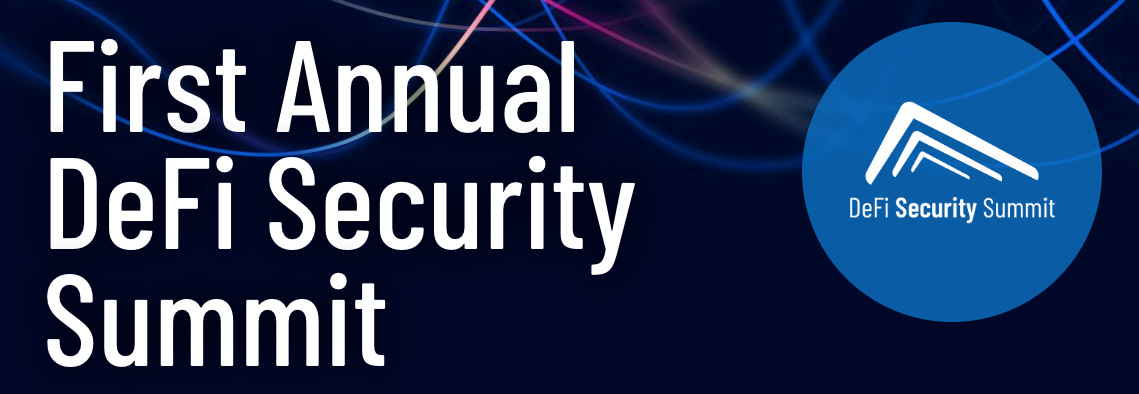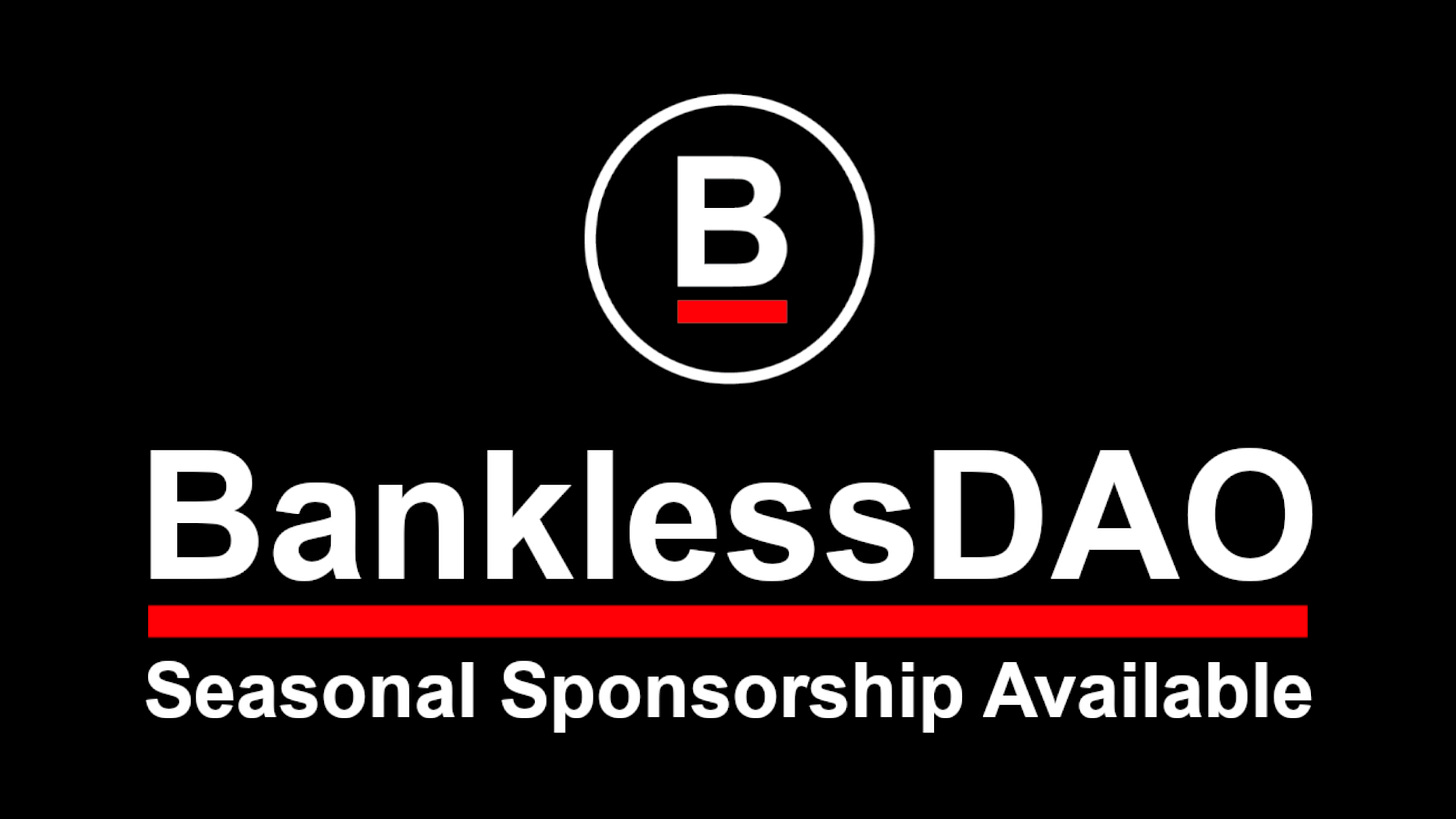DAOs as Playgrounds for Growth and Development
You're reading State of the DAOs, the high-signal low-noise newsletter for understanding DAOs.
gm gm and welcome to the State of the DAOs!
The crypto banks and retail investors are down bad, but that doesn’t mean we’re not shipping products. This is a build market, baby! While we’re all working hard and doing things to better the world, it can be easy to forget to have fun along the way. In DAOs, we get wrapped up in governance, building, and shipping, but siddhearta reminds us that DAO-life is a playground.
He shows us how to create our own characters, reimagine the games we play, and build brotherhoods, sisterhoods, and personhoods through cohorts. DAOs play a key role in the “regen economy”, and play is an essential part of creating a regenerative community.
Next, we share the TL;DR on the latest DAO ecosystem takes and thought pieces, making it easy for you to cut through the noise and stay up to date on the world of DAOs.
This is the current state of the DAOs.
Contributors: BanklessDAO Writers Guild (siddhearta, anointingthompson1, CuratedX, Warrior, WinVerse, hirokennelly.eth, Jake and Stake)
This is the official newsletter of BanklessDAO. To unsubscribe, edit your settings.
DAOs as Playgrounds for Growth and Development
Making the Case for Cohort-Based and Project-Based Learning
Author: siddhearta

One of the biggest design challenges for DAOs is to create an active, engaged community around a shared mission or purpose. DAOs without a clear mission or a shared purpose end up experiencing a lack of focus and community coherence. Passive communities, where members are waiting to be told what to do and how to do it, lead to centralized organizations where top-down decision making determines the course of operations.
DAOs are playgrounds for exploring design challenges in areas like governance, organizational structure, community incentives, personal sovereignty, and professional development. But even with an emphasis on exploration, creating engagement is hard; it requires an opt-in system and self-directed members who are accountable and striving to level up.
To facilitate engagement, many DAOs are structured around guilds which serve as professional talent centers for onboarding members and getting members involved in projects. While DAOs often focus on onboarding and contribution, one of the most promising aspects of guilds is their ability to provide opportunities for personal growth and professional development by taking advantage of the natural human instinct to explore our curiosity and engage in play.
My thesis: by creating cohort-based learning courses and encouraging project-based learning, guilds can facilitate members exploring their curiosity and engaging in the playful act of taking on a variety of roles as they build the life they imagine.
Role-Playing in DAOs
You may be familiar with MMORPGs, or massively multi-player online role-playing games, like World of Warcraft or Final Fantasy. These games usually involve groups of people working together to complete a quest, which often requires leveling up their skills, collaborating with teams to build trust, and coordinating with others to accomplish their mission.
Sound familiar? This is what it’s like to work in a DAO.
There are some key themes that we can learn from MMORPGs that are important for working in DAOs:
You define your role. You are responsible for creating your own adventure and customizing your role. In these games, players assume an identity, which in DAOs means carving out and defining your role and its responsibilities. In contrast to traditional work, people in DAOs generally assume many roles. You don’t show up as dragon slayer to every game, no matter how cool she is — sometimes you have to be the warlock.
Send them on quests. Quests are skills challenges with a problem to solve. For DAOs this could be completing a task like writing or designing, voting on Snapshot, commenting on a proposal, voting in a poll, writing a proposal, forming a team around an idea, or joining a multi-sig. Some quests focus on strengthening skills, while others are about finding your niche and the unique role you have to play in the DAO.


Level up.
It is important to take on tasks and roles, and then continue to develop and grow into other roles. Explore the edges of your comfort zone. Cultivating a growth mindset is critical to thrive in DAOs and is required to create an active, engaged community around a shared mission or purpose.
Focus on social coordination. You need to focus on building trust and team dynamics. Collaboration and mentoring opportunities provide fertile ground for developing leadership skills and domain knowledge. The hard work in DAOs is often using soft skills such as listening, empathy, open-mindedness, and adaptability.
Create rewards and incentives. All games have rewards and incentives. In DAOs these are not only financial incentives, but also social, cultural, intellectual, and even spiritual incentives. Games reward and incentivize certain behaviors, so it is important that people know what type of game is being played at the beginning. People who arrive at mission-driven organizations with the goal of wealth creation will be met with frustration and mismatched incentives.
Culture is important. Culture is built on values. It shapes beliefs and actions. You need language, symbols, and social dynamics for the community to thrive. Culture can shift our posture, the way we greet each other and the way we work together. Without having to be spoken, culture says, "This is what we do around here." The people who cultivate the community are like healers in MMORPGs. The role of the healer is always present but often unstated (they might be the person who restores the vibes of the community).
Leave a path for others to follow. Lead climbing is an important role in DAOs. Leaders make it easier for others to follow their route by mentoring, spotting people as they reach higher, providing advice learned while setting the route, and backing up new members helps to build a culture that moves together. Get in the habit of writing out role descriptions as you create new roles and projects, leaving a legacy for how things are done for future role holders who can build upon your work and continue to innovate.
When you send people on a shared quest and give them a problem to solve, they will work hard to develop and grow. Leadership traits will start to naturally emerge. People start thinking creatively, solving problems, meditating on their situation, and seeking other perspectives. When they come back, they are transformed by the environment of growth and development and they are able to achieve much more than they could have imagined.
The Games We Play
Once we know some of these key elements to working in DAOs, we need to know what types of games we tend to play. The good news? You already know how many of these games are played. You’ve been playing them yourself for quite some time.
Zero-Sum Games
Modern culture loves to play zero-sum games, where one person wins and everyone else loses. We see this in our sports, politics, and yes, in our careers. Our education systems have been designed around these zero-sum games where the goal is to plug you into the system as a ‘good worker’ in order to keep the corporate machine (and the economy) running on schedule.
Most work in today’s society is designed for people to become interchangeable cogs in a corporate machine. The system is designed for efficiency, where you are expected to fill a role and execute within it in a timely and productive manner. This is perhaps a bit of a dire description, but it might ring true for you and your past work. If it doesn’t, count yourself among the lucky ones.

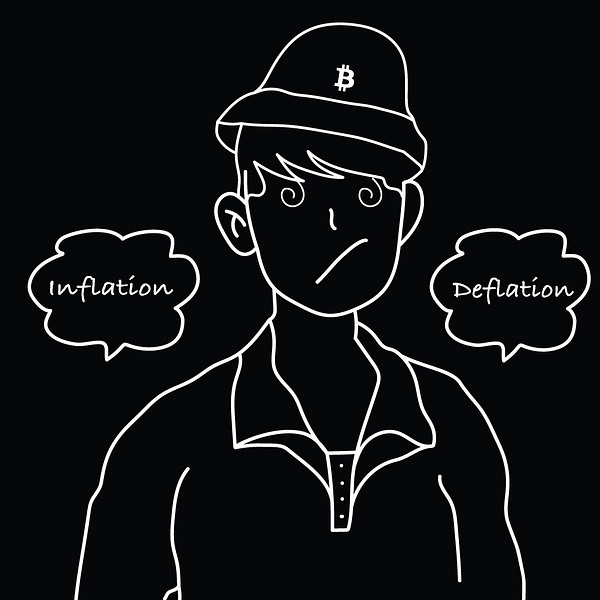
Positive-Sum Games
Positive-sum games are win-win games that occur when resources are increased and an approach is designed where the desires and needs of everyone involved are satisfied. Education is a positive-sum game because even though there may be a distribution of grades, everyone comes out ahead.
Games with Positive Externality
There are certain games we can play that result in a positive externality where both the individual and an increasingly wider set of people benefit from the outcome. An example of positive externalities is when a gardener produces a bountiful harvest that can support themselves and feed their community, while also promoting a thriving ecosystem of birds and bees.
In DAOs, this is really captured by the idea of a person promoting an idea, forming a squad around it, and creating positive value for the whole team and the DAO, as well as becoming a public good.
Regenerative Games
Regenerative games are designed to regrow, renew, or restore systems, especially those that are damaged or lost like the environment, financial systems, and the well being of society. Regenerative initiatives are frequently designed for environmental and biological systems, but can also occur at the individual and organizational level.
The Network’s goals are to support the development of rich, knowledge-sharing and skill-building networks within and across communities; increase regenerative capacity at the individual, organizational, community, bioregional and global scales; and help drive aligned capital toward regenerative initiatives. —THE FIELD GUIDE TO A REGENERATIVE ECONOMY
We can design regenerative systems that restore human potential and organizations that promote human thriving. By combining regenerative system design with crypto values like decentralization, self-sovereignty, and transparency we can create regenerative cryptoeconomic systems. Regenerative cryptoeconomics is the use of crypto values and incentives to design new kinds of regenerative systems, applications, and networks.
Infinite vs Finite Games
Are you playing to win or playing so that you can keep on playing? Finite games are games that come to an end; these are the everyday games we play with the goal of winning. Infinite games are played with the goal of continuing play, requiring players to invite others, explore the boundaries of what’s possible, and when necessary, change the rules in order to keep on playing.
In DAOs, you can play an infinite game by role-playing your way through projects and teams with the goal of being able to keep on playing (or keep on working in DAOs) in the future. As you develop your skills and share your gifts, you give rise to positive-sum benefits for your team and the DAO. Certain types of projects can give rise to positive-externalities, which benefit people outside the DAO or society as large. Lastly, engaging in this type of work can be regenerative, not only for your own sense of worth and purpose, but also as a community that works to promote public goods.


Cohort and Project-Based Learning as the Ultimate Playground
Take a look at most online courses on Udemy, Skillshare, or Coursera and you will see online courses for learning skills or otherwise transferring knowledge. These courses are designed so that you can learn for minimal cost on your own time, and often involve getting some type of certificate upon completion. If you are looking for knowledge or to learn a new skill, these types of courses are great, but they are not without their problems.
What have we learned from Web2 online courses?
Online courses are great for transfer of knowledge, but this does not always translate to the fast paced, collaborative environment that we find in actual workplaces, much less the way we work in DAOs.
Great for learning skills (especially things like coding, software programs, techniques).
Learn on demand, on your own time.
Cheap or free education.
Low completion rate.
Relies on self-directed learners.
One-directional learning from teacher to student.
Passive consumption of material.
Courses tend to be un-engaging.
Online learning has worked well for the corporate world where you are expected to develop competency and it is useful to have a certificate for what you know how to do (this gives you flexibility and job options).
While online courses can promote and encourage growth-mindset-type learning, they fall short for developing soft skills that are required for human flourishing and development. This is the hard work of leading, sharing an idea, collaborating with others, building a team, and showing up with preparedness and readiness.
DAOs are the ultimate playground for developing these skills.
Cohort and project-based learning courses bring together elements of role playing with a keen understanding of the types of games we play.
Cohort-based learning courses are organized around a group of people (cohort) moving through a curriculum that requires collaboration and team communication. As opposed to the passive transfer of skills or knowledge that we see in online courses, cohort-based courses (CBCs) are designed for building in public with others.
Cohort-based learning courses plant the seeds for a culture of project-based learning, where contributors continue to learn, develop, and grow into various roles in the DAO.
There is power in sending people on quests, learning in groups, and developing a body of people that moves together. This is how you create a regenerative community that amplifies human potential and creates a path towards solving our most challenging problems.
Both project and cohort-based learning can be designed to be positive-sum games, with positive-externalities, and even have regenerative benefits if we prioritize well being and the health of the community.
Principles of Cohort-Based Learning Courses
The principles of this type of learning include:
Live, engaged, active learning. These environments are great for developing soft skills. Focus on the ‘how’ of learning—how we work together, how we communicate, how we share ideas, how we deal with resistance.


Collaborative, team, or pod based. Projects and cohorts provide interactive, bi-directional learning opportunities between the leader and students, and between students. Small and mid-size groups produce more discussion, feedback, and dialogue because there is nowhere to hide. Members need to show up and contribute, which creates more accountability over the long term.
Creative, generative content. Passive knowledge transfer is great for online courses, but in cohorts the goal is to create, synthesize, analyze, and evaluate. Play with different learning modalities like break-out sessions, role-playing, and discussion forums. Involve different parties in the generative process, including leaders, coaches, and other members.
Synchronous, hands-on learning. Online courses are async and on your own time, cohorts and projects-based learning requires people to collaborate and communicate in real time. Cohorts should have fixed start and end times, and as part of a quest, projects could benefit from members taking on roles for a set period before continuing to explore other roles. This creates a sense of urgency and focus that promotes growth and development.
Value of community. By getting involved in projects, leveling up your skills, and engaging in cohort-based courses, you and the DAO experience positive-sum benefits. Learning how to work in DAOs produces network benefits for the whole community. These are skills that you can continue to develop as you continue on your DAO journey, traveling with a tight-knit cohort of fellow travelers.
Going Full Regen
DAOs can play a key role in writing the story of a new economy, one built around well-being and human flourishing. Building cohort-based learning courses and facilitating project-based learning can amplify leadership skills and create a space for ideas to be explored in a community of builders. As we see more success stories in DAOs, there will be increased awareness that creating regenerative networks is possible: communities where knowledge sharing, education, and lifelong development are the norm rather than the exception.
Actions steps
📖 Read In Online Ed, Content Is No Longer King—Cohorts Are | Wes Kao
⛏️ Dig into Positive Sum Worlds: Remaking Public Goods | Laura Lotti, Sam Hart, Toby Shorin
🎧 Listen Green Pill 11 - Pet3r Pan of MetaCartel
DAOs at a Glance
Hand-picked articles to understand the current state of the DAO ecosystem

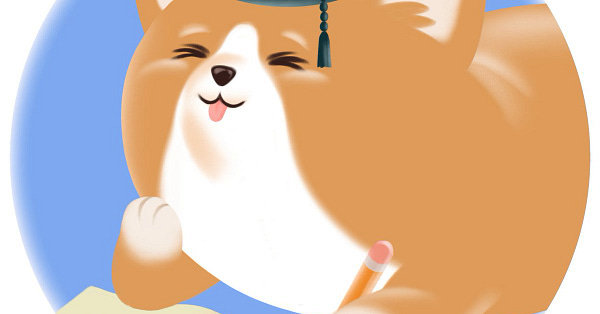


Decentralized Autonomous Organizations: Beyond the Hype
Author: Kevin Werbach, Aiden Slavin, Bianca Kremer, David Gogel
The World Economic Forum has put together a Wharton Blockchain and Digital Asset Project have put together a white paper as a foundation for policy makers, regulators, and senior business leaders on the DAO ecosystem. The intention for this white paper is to provide an overview of the DAO landscape, explore advantages and disadvantages of DAOs compared to traditional organizations, and to break down some of the key risks of the space.
This report goes into detail about the history of DAOs, how to launch and manage a DAO, defining key terms and categorizing the different types of DAOs, as well as breaking down specific legal and regulatory challenges DAOs face. Their conclusion is that while DAOs face many uphill challenges, if they can improve human coordination they can eventually produce dramatic economic and social gains.
WTF is an Impact DAO?
Author: Gaye “Gaia” Soykok
Impact DAOs are essentially DAOs that are created to bring a larger impact and movement that usually gets missed. They aim to drive shared interests and needs of the commons. The objectives of Impact DAOs include -
To solve unfulfilled needs that governments and businesses cannot fully cover, such as education, public goods etc.
To fulfill unmet demands by introducing new building blocks, economies, and organizations.
To introduce ecosystem thinking which is beyond thinking for humans.
Here, we talk about how DAOs enable regens to regenerate, focusing on the aspect of decentralization. Based on this, we categorize impact DAOs into different buckets.
Regenerative funding - This could be for economic and financial support for individuals building or even for projects.
Regenerative Nature - These are focused on practices and activities closer to nature, like farms, forests, water, nature etc. and setting economies to grow on this ideology.
Regenerative Practices - These build and promote practices to enable principles and processes of regeneration that will help other impact DAOs and the society.
Education - Impact DAOs creating an impact specifically in the education space.
Science & Health - These DAOs focus on scientific research, healthcare, and applied science, addressing the most urgent issues that present systems are insufficient to address.
Social & Living - These focus specifically on lifestyle, human connection, wellness and social networks.
There can be a number of other categorizations of DAOs and impact DAOs as DAOs expand into newer avenues and gain more and more traction. What kind of impact and how impact DAOs really make an impact is something that we will see in the future as they grow and continue with the regenerative force.
Web3 Use Cases: Today
Author: Packy McCormick
What do the use cases of Web3 look like over the next decade? In this article Packy makes the case for Web3 tech powering products, networks and models that we can’t even imagine today. Many of the Web3 use cases are similar to Web2, but the utility that crypto-native tools provide will have a dramatic impact on growth and development.
For example, NFTs currently provide properties that create uniqueness, verifiable ownership, and the ability to transfer and document the movement of goods. In the future, the use case of NFTs will be much more beneficial than they are today.
The most optimistic take from Packy is that while there are many use cases today, the real impact is yet to be seen as thousands of creative, resourceful, generous, and collaborative people come together to build the next innovation.
DAO Structure: A Comprehensive Primer
Author: Ouija
The DAO structure is an important factor when considering a DAO. It is the foundation upon which a sustainable DAO is built. The founding team as well as the community, through governance and implementation, define the structure of the DAO.
CoreDAOs is one of such structures where the founding team leaves governance to the hands of the community. Another structure is the govDAO, here, governance systems are characterized by the voting power derived from incentivizing and renting liquidity. The last structure is the pseudoDAOs. This is the most centralized as there is a high degree of team control by core members without much governance or engagement.
With blockchain and smart contracts bringing trust to governance and with focus on the practice of algorithmic policy making and algorithmic governance rules, greater potential within the DAO can be realized.
Ecosystem Takes
🔥 and 🧊 insights from across the DAO ecosystem

What Does A Dao That Can Run For 10 Years Look Like?
Author: BlockBB
Top organizations that have lasted for a long time are known to have similar traits that helped them preserve their longevity. With funds being the major aspect to consider when striving for longevity, these organizations are able to hold up through donations and investments, product services, and membership fees.
Here are some areas DAOs can look out for to set themselves up for longevity:
While a DAO can be easily set up, it can just as easily fizzle out.
Only provide a token after you provide a valuable service.
If tokens are provided too early without a valuable service, the token fails to find value support.
DAOs should tier tokens in a bid to solidify them.
Each DAO should have their own process towards decentralization.
Positive Sum Worlds: Remaking Public Goods
Author: Laura Lotti, Sam Hart, Toby Shorin
🔑 Insights:
Public goods are anything that cannot be excluded, that does not rival people's sentiment or thinking, and that allows people to live and let live. Clean air can be considered to be a "public good" because it satisfies the values that are shared.
Cryptocurrency protocols can be considered a public good because the ambitions are centered on coordinating solutions to our biggest challenges, building sovereignty, and provide open access for users.
With the high level of wealth creation in the space, DAOs should be able to build public goods that reach beyond their own communities.
To create an economy that aligns with our values, we need a much more stronger connection between our notion of the public interest and how decisions are made on the public's behalf.
To build a sustainable culture, members of communities must interact with fellow community members beyond the circle of tokenholders.
Visions of a truly global DAO representing billions of people are mere speculations. But if we apply the principle of "positive externalities" to include the next generation of citizens of the places we live, protocol-built public goods will begin to look more like community-driven industrial policies.
How do you build a web3 community the right way
Author: Abbas Shaikh
🔑 Insights:
It is important to build the right community based on the mission, product offering and member profile of the project. This is critical to the continued success and growth of any protocol. There are few key pointers to uncover and simplify in order to create an effective community.
Building the community utility - This should be a brief pitch to explain how the project adds value for the members. This can be by giving access to the network, information, capital, distribution etc.
Understanding member motivations - These can vary from desire to learn, earn, build valuable networks, build, contribute etc.
Understanding North Star or the differentiating factor - You need to align the offering based on the member's motivations and build on ways to achieve those goals and keep up their motivation levels. This also depends on how members are organized within the community.
Defining roles within the community to help community members build their credibility & voice through contributions. These can also involve giving governance rights.This helps in building reputation within the community basis the proof of work.
Incentive structure - Incentives can vary from financial (token rewards) and non-financial (governance rights, roles) but do act as a driving force to be part of the community.
On DAOs and the Rise of Superintelligence in Our Lifetime
Author: Samantha Marin
🔑 Insights:
Artificial superintelligence, a human-made intelligence that will outshine the intelligence of humans, is anticipated to emerge in the next few decades. This form of intelligence is more advanced than anything we can imagine and can't be contained upon its emergence. Interestingly, the MolochDAO whitepaper discusses the need for DAOs to take AI seriously, and in this article Samantha lays out ways in which DAOs could play a role, including:
DAOs and Web3 could provide means of coordinating humans that skirt the line between total human autonomy and total computer automation.
DAOs allow coordination at scale in a post-ASI world.
Retaining and maximizing the human element of DAOs.
DAO Spotlight: PleasrDAO
PleasrDAO is a collective of DeFi leaders, NFT collectors, and digital artists. They began with collecting pplpleasr’s piece “xy=k” (Uniswap V3 NFT) after pplpleasr vowed to donate the proceeds to Asian and Pacific Islander focused charities.


As such, PleasrDAO is focused on charitable initiatives and collecting high-value, culturally relevant pieces that have a positive impact on the world. The DAO has also purchased the famed unreleased Wu Tang Clan album “Once Upon a Time in Shaolin” for $4 million from the estate of the villainous security fraudster, Martin Shkreli. PleasrDAO is also well known for purchasing the “Stay Free” piece by Edward Snowden for $5.5 million. The proceeds of which went to the Freedom of the Press Foundation, a non-profit that sponsors digital security tools & legal advocacy for journalists and whistle-blowers.
Another notable acquisition is “Virgin Mary, Please Become a Feminist” an NFT by @pussyrrriot, with the proceeds going to Медиазона Russia’s independent news outlet focusing on social justice, activist Nasiliunet who fights against domestic violence, and to political prisoners generally.
The DAO has continued to stay on crypto’s cutting edge by exploring new ways to democratize NFT ownership including fractionalization of the original doge meme NFT into the $DOG token.
Look at their incredible collection of art here and follow this DAO OG on Twitter to stay up to date on the latest happenings.
Get Plugged In
Event Highlights
ETHCC 5 —Paris, France— The Ethereum Community Conference (EthCC) is the largest annual European Ethereum event focused on technology and community. Three intense days of conferences, networking, and learning. Covering many different subjects at different levels education through conferences and workshops. The Maison de la Mutualité will be accessible from 9 AM to 7 PM July 19-21, 2022.
DeFi Security Summit —Stanford, California— is the inaugural DeFi security event to address pressing DeFi vulnerabilities and mitigation strategies. The summit includes discussions and talks about DeFi vulnerabilities, cross-chain security, and audits. Confirmed speakers include Aave Head of Smart Contracts, Emilion Frangella, Nexus Mutual Founder Hugh Karp, and Optimism Security Engineer John Mardlin. August 27-28, 2022, Paul & Mildred Berg Hall, Stanford University, Stanford, California, USA.
DevCon Bogota—Bogota, Columbia—hosted by the Ethereum Foundation that’s geared toward developers, researchers, and movers within the Ethereum ecosystem. Devcon aims to deliver a holistic learning experience through panels and workshops. This conference is for builders of all kinds: developers, designers, researchers, client implementers, test engineers, infrastructure operators, community organizers, social economists, artists, and more. Oct 11-14 📌 Agora Bogotá Convention Center.
ETH San Francisco—San Francisco California—Hailed as the West Coast’s premier Ethereum event of 2022, ETH San Francisco unites blockchain and crypto enthusiasts, as well as developers, industry experts, and tech companies. Discover more Ethereum events around the world here and check out the ETHGlobal site to get more updates about this and other upcoming events. November 3-5, 2022, San Francisco, USA.
🧳 Job Opportunities
Get a job in crypto! Do you like solving hard problems, care about building more efficient markets for everybody, and want to work at the frontier of decentralized finance? Rook is looking for full time contributors, with salaries ranging from $169,000-$722,000. There are positions ranging from engineering, recruiting, product marketing, copywriting, and design. Sound interesting? Sign up for our referral program and go full-time DAO.
Solidity Developer
Sr. Backend Engineer (Python)
Frontend Engineer (React/Typescript)
Executive Assistant (❌ technical)
Sr. Copywriter (❌ technical)
2D Graphic Designer
Quantitative Analyst
Please contact Siddhearta either in BanklessDAO’s Discord or on Twitter for more information.






